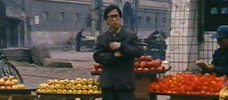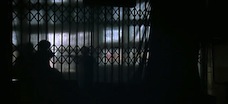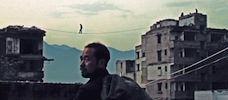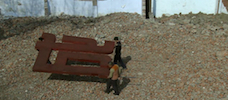Reviews
Jia Zhangke
Hong Kong / China, 2006
Credits
Review by Leo Goldsmith
Posted on 01 June 2011
Source dGenerate Films DVD
External links
Categories Jia Zhangke’s Migrations
Last month, senior Chinese officials acknowledged for the first time some of the many grave human, ecological and geological problems the Three Gorges Dam Project has caused the region around the Yangtze River. The dam, which according to The Guardian, has created a reservoir nearly the length of Great Britain and has been linked to pollution, landslides, erosion, compromised water supplies and river-transport routes, and possibly even earthquakes resulting from the pressure of the massive amount of water pumped into the region. The direct impact on human lives has been perhaps the most visible result, especially the massive population displacement. About 1.4 million people were evacuated to make way for the reservoir, and over one thousand towns flooded, some of which were over a thousand years old.
Still Life and Dong, Jia Zhangke’s two films partly about the effect the project has had on the people of the region, center around one of these ancient cities. Fengjie, home to the Qutang Gorge, is captured by Jia’s films as it vanishes: landscapes seem to dematerialize in the distant fog while, in the foreground, buildings are ripped apart by the hands of dozens of shirtless laborers. In Dong, Jia’s first documentary proper, it is here that we find Liu Xiaodong, famous realist painter, surveying the landscape and wandering amid industrial ruin. Liu is in Fengjie to paint portraits of these laborer as part of a new series of his trademark large-scale canvases, and we watch as he positions an awkward group of these men, all idling in their underwear, on a rooftop overlooking the Yangtze. (These include, self-referentially for Jia, Han Sanming from Still Life.) Liu also wanders in and out of decaying structures, moodily observing the dank, industrial landscape that he says resembles his hometown, and muses on his process of art-making.
Like Useless, Dong forms part of a series of non-fiction films on the work of artists in contemporary China, and as in the other film, Jia seems to use these works to meditate on his own role as a creator. In Liu, Jia finds a particularly significant subject: as a student at Beijing’s Central Academy of Fine Arts, Liu starred as the lead in Wang Xiaoshuai’s The Days and served as art director for Zhang Yuan’s Beijing Bastards, both made in 1993 and two of the early masterpieces of “Sixth Generation” cinema in China. (He also briefly shows off his chops in the karaoke club scene in The World.) Liu’s alignment with neo-realist, post-socialist Chinese cinema in some way complements his work as a painter, which is largely made up of portaits composed in a rough, but naturalistic style, vaguely reminiscent of Lucian Freud.
Liu notes that he likes to “observe my subject[s] from a great distance” in order to portray them, and indeed his orchestration of his Fengjie laborer-models suggests the somewhat elitist distance of an artist from his subject. This charge could easily be leveled at a filmmaker like Jia, or indeed nearly any documentary filmmaker. But Jia himself seems quick to point up Liu’s forced interactions with locals, like his donations of toys to local kids, and his somewhat self-serious mannerisms, like his bumbling practice of martial arts, which he claims is his way of fending for himself and strengthening his body in the face of “a flawed legal system.”
Such moments emphasize Jia’s ambivalence about his own work as well as Liu’s, an acceptance or even deliberate attempt to problematize the artist’s role in the face of pressing social issues. This is further explored in the film’s second half, in which Liu visits Bangkok to paint portraits of sex-workers. Paired with the Fengjie series, it’s clear that Liu means to document, in some sense, the alienation of the working class from their labor, and as he reports at the end of the film, his intention is to use their bodies both to express something of himself and to give back to the subject something like dignity. And while Liu’s disquisitions on the difficulty and serious labor involved in being an artist seem a little dubious in light of the labor of his subjects, he is nonetheless realistic, even cynical, about the possibility of effecting real “change through art.”
Jia reinforces this with an image of Liu’s completed canvases of the laborers, set on the same rooftop where they were painted: the painted background of buildings, mountains, and riverboats eerily mirrors the already surrealized landscape of the Three Gorges Dam Project, but the works’ effectiveness ends with representation, documentation. One is tempted to contrast Liu’s statements about art and change with those of the incarcerated (indeed, practically disappeared) artist Ai Wei Wei, but it’s interesting to note the differences between the artists. Ai is the son of one China’s most famous modern poets, a victim of the Cultural Revolution, and his explicitly anti-authoritarian stance is born of a profound understanding of China’s bureaucracy and rulin class. Liu, like Jia, comes from a Northern industrial town and had to migrate to Beijing to make a life as an artist, an experience that parallels that of many migrant workers simply struggling to find a foothold in China’s burgeoning quasi-capitalist restructuring.
Thus, when Liu likens his “ruined, incomplete” canvases to the works of the ancient Northern Wei dynasty, he is not - or is not only - pompously aggrandizing his own artistic work, nor is he taking a deliberately nationalist stance against the valorization of Western classical art. He is also revealing part of his interest in the mystery of lost civilizations, something of which he finds in the used and discarded lives, experiences, and bodies of his subjects. For Liu, as for Jia, the background that surrounds these figures is shaky, sketchily rendered, even evaporating, but the bodies themselves remain ineluctable. Equivocal though it is, art is nonetheless also something that must struggle to break free of repressive circumstances, an assertion that Jia renders in an oblique final image: two blind men roaming through a Bangkok market crooning loudly through a portable karaoke machine.
More Jia Zhangke’s Migrations
-

Xiao Wu
1998 -

Unknown Pleasures
2002 -

The World
2004 -

Useless
2007 -

Still Life
2006 -

Dong
2006 -

24 City
2008
We don’t do comments anymore, but you may contact us here or find us on Twitter or Facebook.



